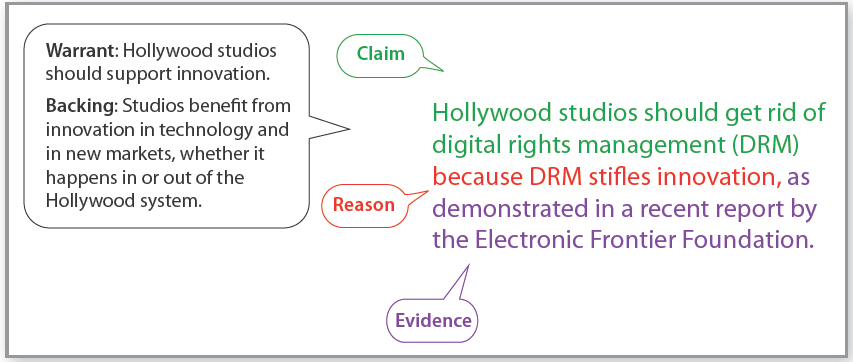Develop Reasons to Accept Your Overall Claim
Few readers will accept “because I’m right” as a good reason to accept your position on an issue. They expect you to explain why you’re right. Developing an explanation begins with identifying reasons that are consistent with your own perspective on the issue. At this stage of your writing process, don’t worry about whether your readers will be convinced or persuaded by your reasoning. Instead, treat your efforts to develop reasons to accept your overall claim as you would any other form of brainstorming. As you generate a list of potential reasons, you can certainly begin to ask whether the reasons you’ve identified are well grounded, logical, and consistent with the values and beliefs held by you and your readers. And later, as you draft your essay, you can decide how to present your reasons to your readers. For now, though, your primary goal is to generate as many potential reasons as possible to support your overall claim.
Generate ideas about potential reasons. Your understanding of an issue and the conversations surrounding it will provide a framework within which you can develop a set of reasons to support your overall claim. To guide your efforts, ask questions such as the following, and respond to them by brainstorming, freewriting, blindwriting, looping, clustering, or mapping:
- Costs. What costs are associated with not accepting and acting on your overall claim? Are there monetary costs? Will time and effort be lost or wasted? Will valuable resources be wasted? Will people be unable to lead fulfilling lives? Will human potential be wasted? Will lives be lost?
- Benefits. What will be gained by accepting and acting on your overall claim? Who or what will benefit if the claim is accepted and acted on? What form will these benefits take?
- Alternatives, choices, and trade-offs. What is gained by accepting and acting on your overall claim? What is lost by not doing so? In what ways are the potential costs or benefits associated with your overall claim preferable to those associated with rejecting it?
- Parallels. Can you find similarities between the overall claim you are making about this issue and claims made about other issues? Can you argue that, if your claim is accepted and acted on, the outcomes will be similar to those found for other issues? What consensus, if any, exists among experts on this issue about what similar situations have led to in the past?
- Personal experience. What does your personal experience tell you is likely to happen if your claim is accepted and acted on? What does it tell you might happen if it is rejected?
- Historical context. What does history tell you is likely to happen — or not happen — if your claim is accepted and acted on? What does it tell you might happen if it is rejected? What consensus, if any, exists among experts on this issue about what similar situations have led to in the past?
- Values and beliefs. In what ways is your overall claim consistent with your values and beliefs? With those of your readers? In what ways is it consistent with larger societal and cultural values and beliefs? How might it further those values and beliefs?
Examine the list of reasons you’ve generated to determine which ones fit best with your overall claim, your purpose, and what you know about your readers. Select the reasons that, individually and as a group, best support your overall claim.
Decide how your reasons support your overall claim. Effective arguments make connections (sometimes called warrants) between the overall claim and the reasons offered to support it. Sometimes readers accept a connection because they share the writer’s values and beliefs or have similar experiences with and knowledge of an issue. In other cases, readers accept a connection because the writer explains it effectively. This explanation (sometimes called backing) provides readers with information and analysis that help them understand and accept the connection.

The reasons you choose to support your overall claim should reflect your understanding of the conversation you’ve decided to join. Your reasons should emerge from careful thought about the information, ideas, and arguments you’ve encountered in your reading. Your reasons should reflect your purpose and goals. And they should take into account your readers’ needs, interests, backgrounds, and knowledge of the issue.
As you consider your reasons, ask how clearly they connect to your overall claim. Ask whether you should explain each connection or leave it unstated. Your answers will depend in part on the extent to which your readers share your values, beliefs, experience, and knowledge of the issue. If your readers’ backgrounds and knowledge differ from yours, connections that make sense to you might not be clear to them.